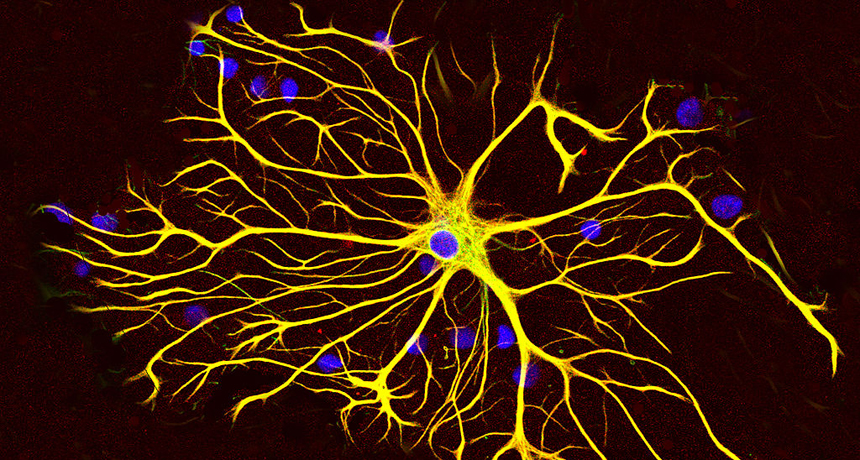Hunger’s little helpers
Brain cells called astrocytes may play an important role in controlling that yearning for food

Brain cells called astrocytes, such as the one shown here, may play a role in hunger and eating. A new study on mice explores how these cells respond to leptin, a “stop eating” hormone produced by fat cells.
GerryShaw/Wikimedia Commons
After a large meal, fat cells send a “stop eating” signal to the brain. A chemical called leptin — one of the body’s hormones — relays that signal to important brain cells called neurons. But a new study in mice suggests that neurons aren’t the only cells getting that “I’m full” message. Leptin also excites brain cells called astrocytes. And they, too, may play a role in turning off hunger, a new study finds.
Astrocytes have long played second fiddle to neurons — also known as nerve cells — in research studies. Scientists had believed that the main job for astrocytes was to support neurons. The new study indicates astrocytes do more than that.
“That historical notion that [astrocytes] are cushions for the neurons to feel comfortable or protected is not the case,” Tamas Horvath told Science News. This neuroscientist works at the Yale School of Medicine in New Haven, Conn.
One part of the brain involved in choosing when and how much to eat is the hypothalamus. Earlier studies showed its neurons detect leptin. They also respond to this hormone. For example, if the hypothalamus of a mouse doesn’t recognize leptin, the animal will overeat, becoming obese.
Other studies had found that astrocytes, too, can detect leptin. Horvath and his colleagues wanted to know if these cells — like neurons — affect appetite. To find out, they bred mice with astrocytes that couldn’t detect leptin.
Under normal conditions, these mice ate a normal amount of food. They did not become obese. Once scientists deprived the animals of food, however, that changed. Now super-hungry, these rodents ate more food than did mice that could still detect leptin. This suggests astrocytes indeed play a role in hunger.
In other words, Horvath notes, the astrocyte affect showed up only in the presence of extreme hunger.
He suspects it might one day be possible to treat obesity by targeting astrocytes, perhaps by getting more leptin to them.
Jenni Harvey is not convinced. She’s a neuroscientist at the University of Dundee in Scotland. Fat cells make leptin, she notes, so obese people already produce more than enough. In fact, she says, that oversupply eventually may cause the brain to stop responding to leptin. As a result, she told Science News, treatments based on boosting leptin levels in the brain are “unlikely to result in a cure for obesity.”
Harvey admits that the new work is only “scratching the surface” of astrocyte research. “There are a lot of questions that need to be answered.”
Power Words
astrocyte A type of non-nerve cell found in the brain.
cell The smallest structural and functional unit of an organism. Typically too small to see with the naked eye, it consists of watery fluid surrounded by a membrane or wall. Animals are made of anywhere from thousands to trillions of cells, depending on their size.
hormone A chemical produced in a gland and then carried in the bloodstream to another part of the body. Hormones control many important body activities, such as growth. Hormones act by triggering or regulating chemical reactions in the body.
hypothalamus A region of the brain that controls bodily functions by releasing hormones. The hypothalamus is involved in regulating appetite through release of appetite-suppressing hormones.
leptin A type of hormone made by fat cells that inhibit hunger.
neuron ornerve cell Any of the impulse-conducting cells that make up the brain, spinal column and nervous system. These specialized cells transmit information to other neurons in the form of electrical signals.
neuroscience The science that deals with the structure or function of the brain and other parts of the nervous system. Researchers in this field are known as neuroscientists.
obesity Extremely overweight. Obesity is associated with a wide range of health problems, including type 2 diabetes and high blood pressure.







